#Sen Dynasty
Explore tagged Tumblr posts
Text
Tara Devi Fair Shimla: A Celebration of Tradition and Scenic Beauty
#Durga Ashtami#Himachal Pradesh#Keonthal State#Navratri festival#Sen Dynasty#Tara Devi Fair#Tara Devi Fair Shimla#Tara Devi Temple
0 notes
Text
What’s a specific time period you wish there was more historical fiction about
#me personally#Chinese Revolution of 1911#Xinhai Revolution#the drama#the intrigue#esp since so many of the prominent revolutionaries were#students who had just come back from studying abroad#the Qing was assassinating people left and right#the end of a dynasty and the horror that followed#their vision for China was so clear and beautiful but then it all fell apart almost instantly#feel so bad for sun yat sen honestly#sorry went off on a tangent but it would just be a very very interesting time period to write about
0 notes
Text
An incomplete "there's a good chance the icon you love and support is a Zionist" list
🌟 Raphael Lemkin, a Jewish Holocaust survivor, whose family was murdered during it. Lemkin is responsible for coining the term "genocide," and for every legal provision that exists today against it. His work against genocide was inspired by his Zionism.
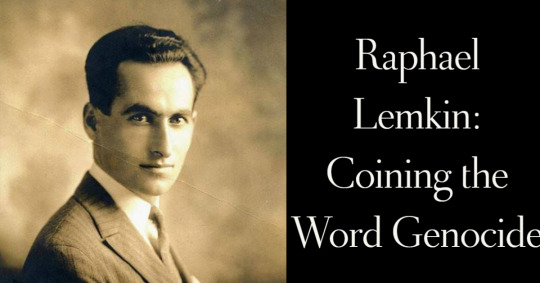
🌟 Martin Luther King, Jr., who did not only support Israel and its right to security, a fellow participant at a dinner with MLK shortly before his assassination quotes him as having stopped a student attacking Zionism, and replied, "When people criticize Zionists, they mean Jews. You’re talking antisemitism." He also encouraged Americans in 1967 to support the Jewish state, as Egypt blockaded the Straits of Tiran, endangering Israeli citizens by cutting the country off from its oil supply.

🌟 Emma Lazarus, a Jewish American poet, whose words ("Give me your tired, your poor, your huddled masses yearning to breath free") are engraved on the Statue of Liberty's pedestal, after they helped raise the money needed for its completion. Drawing from the value of Jewish solidarity, she also wrote, "Until we are all free, we are none of us free," adopted as a slogan by intersectionality (while many in the movement exclude Jews from it). She was a great supporter of establishing a state for Jews in the Jewish homeland, having argued for this idea years before the word "Zionist" was even coined.
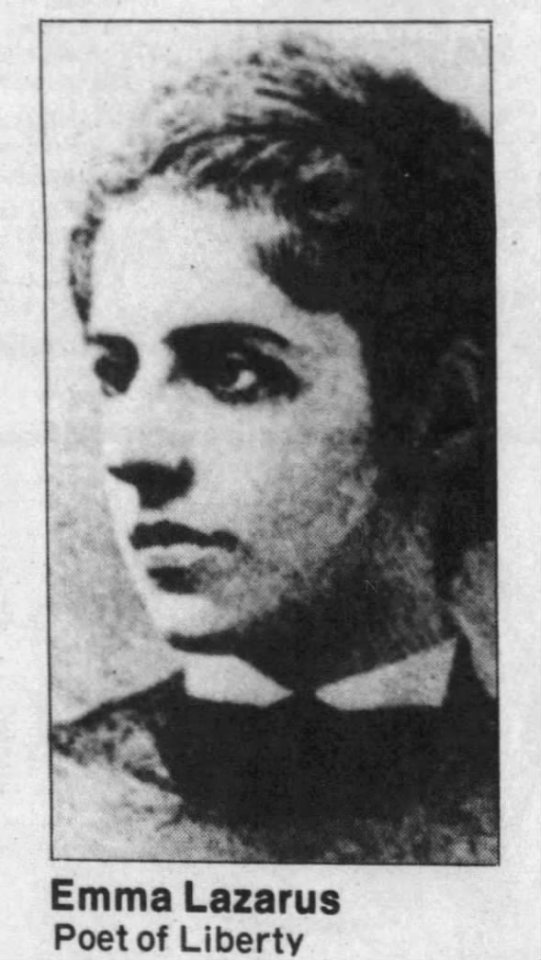
🌟 The 14th Dalai Lama, the leader of the fight against the occupation of Tibet, who was invited in 1994 to Israel, at a time when China's communist regime did its best to prevent his visits anywhere in the world, and who came to Israel more than once, talking about the 2000 years long Zionism of Jewish culture in exile as an inspiration and role model for Tibetans. "Among Tibetan refugees, we are always saying to ourselves that we must learn the Jewish secret to keep our traditions, in some cases under hostile circumstances."
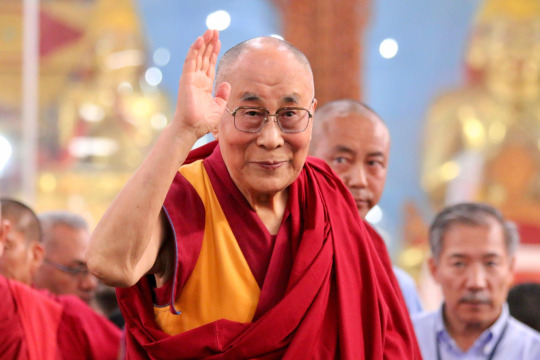
🌟 Ruth Bader Ginsburg, who spoke more than once about how her pursuit of justice is a continuation of that very same thing in Jewish tradition. She had repeatedly referred to American Zionist Jews as sources of inspiration. For example, in 2018, during her fifth visit to Israel, in a speech she gave when receiving the Genesis Award, she mentioned two such women, Emma Lazarus and Henrietta Szold.
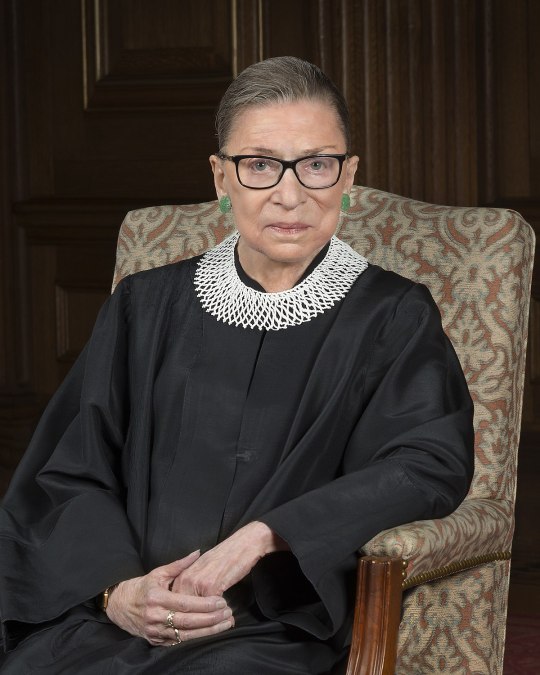
🌟 Nelson Mandela had an ambivalent view of Israel, but repeatedly recognized its right to exist, which makes him a Zionist, he also called upon Arab states to do the same, and was favorable towards the Zionist Jews who supported him during his underground days. Mandela being critical of Israel and still a Zionist is an apt reminder that criticizing the Jewish state and opposing its very existence are NOT the same thing, and only one's antisemitic.
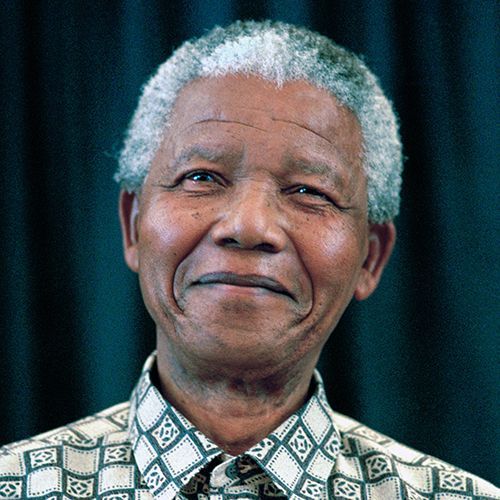
🌟 Felix Salten, the Jewish author of Bambi (the book Disney's movie is based on). The tale was originally a metaphor for Jews suffering antisemitism, something Salten personally had to cope with. He was also an ardent Zionist, feeling the self-liberation at the core of this ideology suited his idea of how to deal with Jew hatred.
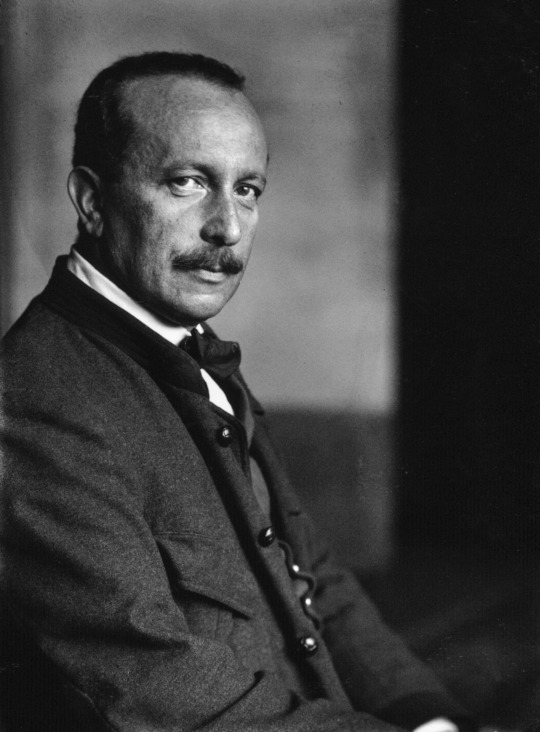
🌟 Sun Yat-Sen, who helped end the rule of China's last imperial dynasty, was its first provisional president, and is nowadays honored as an important Chinese leader in both China and Taiwan (sometimes referred to as "Father of the Chinese Nation"). He was an enthusiastic supporter of Zionism. Among other instances of expressing that, he wrote in a 1920 letter to a leader of the Jewish community in Shang Hai about Zionism that it is, "one of the greatest movements of the present time. All lovers of Democracy cannot help but support wholeheartedly and welcome with enthusiasm the movement to restore your wonderful and historic nation, which has contributed so much to the civilization of the world and which rightfully deserves an honorable place in the family of nations."
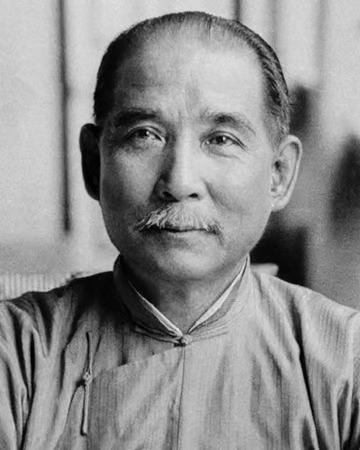
🌟 Magnus Hirschfeld, a gay Jewish sexologist, nicknamed among other things "The Einstein of Sex" and "The Father of Gay Liberation," because his medical and scientific work on human sexuality, as well as social advocacy for women's, gay and trans rights, was nothing short of pioneering. He was persecuted by the Nazis to the point where he died in exile. They broke into his institute of sexual research, where the world's first clinic performing sex reassignments surgeries was located, and burned down the institute's library. Hirschfeld had attended a Zionist conference following the Balfor Declaration of 1917, and his work on sexual liberation found inspiration in young socialist Jewish Zionist workers he met during a visit to the Land of Israel in 1931-2.
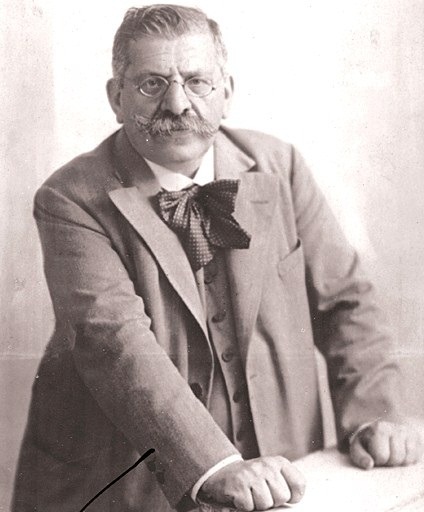
🌟 Marcia Langton, a professor and prominent Aboriginal rights activist from Australia, who has been leading the fight against racism and for her community. She spoke out against the hijacking of native rights movements by terrorist sympathizers and antisemites, and has clearly stood against all loss of life, including that of Israelis.

🌟 Felix Zandman, a Holocaust survivor whose work on resistors is integrated into many smartphones, laptops, cars, satellites, hospital ventilators (saving many Covid patients), airplanes and more. Whenever the anti-Israel crowd is scrolling social media on their phones, they're enjoying the work of a Zionist, who enthusiastically supported the State of Israel, and even introduced an important improvement to the Israeli Merkava tank, which has likely saved many Israeli lives, Jewish and non-Jewish alike, and others like him, since Israel's high tech is considered only second to Silicon Valley (going back to at least the 1990's). If they truly wish to boycott everything that's been "contaminated" by Zionism, they should probably just boycott technology.

🌟 Rosa Parks, an African American leader of the civil rights movement (and someone who personally demonstrated how one can resist without turning violent). She was one of 200 notable black American leaders who publicly organized to express their support and respect of Zionism as the Jewish right to self-determination, and Israel as the manifestation of that right.
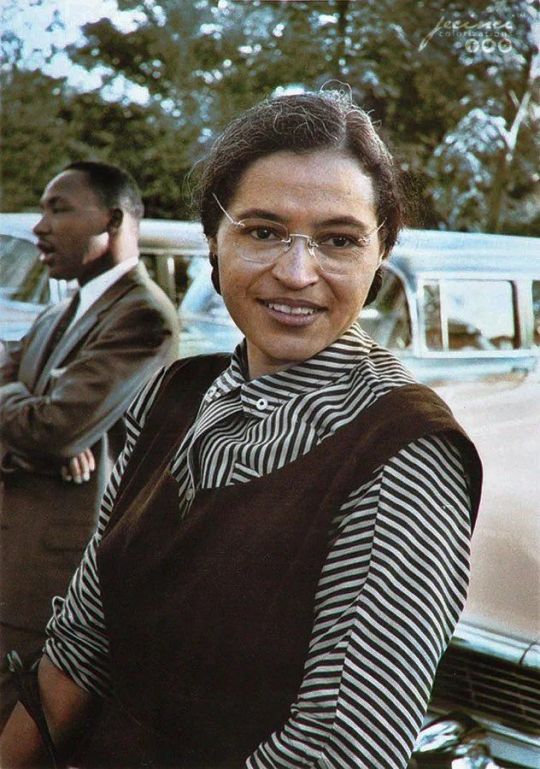
-> Like I said, this is VERY incomplete, even just in terms of how the overwhelming majority of Jews are Zionist, and have been since the inception of Judaism, which is itself Zionist. Over the years, this led to many non-Jewish human and native rights champions to be supportive of Zionism, too. Take note of who is being vilified, when the term "Zionist" is ignorantly used as if it means anything other than belief in the equal right of Jews to liberation and self-determination in the Jewish ancestral land. Especially when it is used as being inherently evil.
(for all of my updates and ask replies regarding Israel, click here)
#israel#israeli#israel news#israel under attack#israel under fire#israelunderattack#terrorism#anti terrorism#antisemitism#hamas#antisemitic#antisemites#jews#jew#judaism#jumblr#frumblr#jewish#resources
806 notes
·
View notes
Text
In the SDCC Q&A, Taliesin mentioned two symbols that Ashton has drawn on the back of their jacket that they've sen in their dreams.
These are the symbols, as depicted in the dice guardian figurine:

The left symbol is reminiscent of the Ashari symbol, and this is the one that Taliesin said that Ashton has figured out its meaning.

The right symbol looks somewhat like the Kryn Dynasty symbol depicting the Luxon beacon.

1K notes
·
View notes
Text
“Roaming into immortality”: Ten Desires and the history of Taoist immortals

As promised last month, following the freshly established tradition I have another Touhou research post to offer. This time, we’ll be looking into the literary traditions focused on Taoist immortals (or, following the Touhou convention, “hermits”, though this is a less suitable translation) and how they influenced Ten Desires. Due to space constraints and thematic coherence, note that only Seiga, Miko and Yoshika will be covered. Before you'll begin, I need to stress that one of the sections requires a content warning. While all images are safe for viewing, there's a description of a potentially unpleasant episode involving unwanted advances, and various events leading to that; I highlighted that before the relevant paragraphs too just in case.
“Hermit”, “immortal”, “transcendent” A post about Ten Desires must start with an introduction of the term sen, the Japanese reading of 仙, Chinese xian. Touhou specifically uses its less common derivative 仙人, sennin, though that's just a synonym. Touhou-related sources basically invariably translate this term as “hermit”. While this option can be found elsewhere too, it is not exactly optimal. “Immortal” is actually the standard translation for both sen/xian and sennin, as far as I am aware. I did a quick survey of recent publications on Brill’s and De Gruyter’s sites and the results were fairly unambiguous, especially for books and articles published after 2000, with “hermit”, “wizard” and other alternatives being quite uncommon. The trend is not new, with sennin already translated as “immortal” in the 1960s. When it comes to xian/sen, in a few cases arguments were made that “transcendent” or “ascendent” would be a more suitable option as it better illustrates the position of these beings, though this is a relatively recent trend, for now limited to Sinology. The idea behind it is that immortality is just one of multiple characteristics attributed to the xian, and it is ultimately the transcendence to a higher level of existence that’s the key element. I personally think the argument is sound, but not all translators have embraced it, and for now the choice is really a matter of preference. Since “immortal” is more widespread, and most of the sources in the bibliography use it, that’s what I will employ in the rest of the article, save for direct quotes from Touhou, where "hermit" will be used.
Early history of immortality in Chinese sources
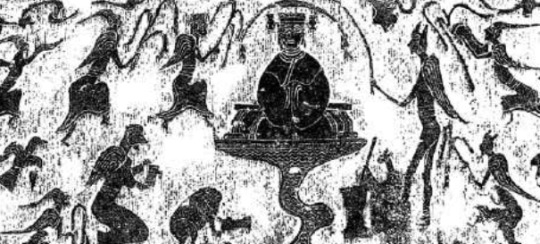
Feathered immortals worshiping Xi Wangmu (from Betwixt and Between: Depictions of Immortals in Eastern Han Dynasty Tomb Reliefs by Leslie Wallace; reproduced here for educational purposes only) The notion of pursuit of immortality, or at least longevity, is first attested in Chinese sources in the eighth century BCE, when the first bronze inscriptions revealing their authors wished to avoid death altogether appear in the archaeological record. However, the ideas which directly lead to the development of the concept of immortals as discussed here only started to develop in the fourth BCE. Initially they were associated with so-called fangshi, a class of multi-purpose esoteric specialists who often served for example as court diviners. These ideas developed before the unification of China by Qin Shi Huang, but their importance grew after this event, as many of their proponents were warmly received in the courts of Qin and Han emperors. Some of them, like Wu of Han, even sent expeditions in search of distant lands where immortals purportedly lived, of which Penglai is the most famous. As a curiosity it’s worth mentioning here that the reception of these pursuits was actually mixed in Chinese historiography. Some of the rationalist Eastern Han authors such as Wang Chong evaluated it critically, basically describing it as a waste of time and resources leading to poor governance. We know relatively little about the development of beliefs focused on immortality outside of the imperial court in the Han period, though it is evident that they gained considerable prominence, and it’s even possible to speak of “immortality cults” among the general populace. That’s for example seemingly how the worship of Xi Wangmu, arguably one of the most famous Chinese deities, became widespread. Tomb paintings showing blissful immortals also appear in this period. In art immortals were initially depicted as winged, feathered beings. The origin of this tradition remains unclear, though it has been noted that various similar bird-like beings are also listed in the Classic of Mountains and Seas, attesting to this being a widespread motif in early Chinese tradition. You might be familiar with portraying immortals as wizened sages instead. This convention only developed when the image of the immortal merged with that of the ascetic hermit in the Eastern Jin period - more on that later.
Immortals in Ge Hong’s Baopuzi

A 20th century illustration of Ge Hong (wikimedia commons)
The first formalized instructions for the pursuit of immortality were compiled during the reign of the Eastern Han. Some of them were rooted in the early Taoist tradition, which at the time was also being partially formalized under the Way of the Celestial Masters. Seemingly many Taoist works dealing with these matters were compiled, but most of them are only known from references in Ge Hong’s Baopuzi, one of the most important texts for the study of the history of ideas about immortality. Ge Hong states that immortality can be obtained through personal virtue and specific practices, including exercise, following strict dietary restrictions and, most importantly, through engaging in alchemy, which he hails as the most effective. All the means to obtaining immortality were unified by one principle: cultivating qi, both by maintaining one’s own and by absorbing it from the right kinds of plants and minerals. Grains were held to be inappropriate food for those pursuing immortality, as it was believed they nourished the so-called “three worms”. The final goal was to be able to use morning dew or light for sustenance. The easiest way to move towards that goal was believed to be consumption of alchemical elixirs, said to possess a more potent, refined form of qi of all their carefully selected ingredients. Needless to say, many of such magical concoctions were highly poisonous thanks to the inclusion of mercury, cinnabar and other similarly exciting substances. Ten Desires describes the consequences pretty accurately: Miko “turned to the use of various unusual materials, such as cinnabar” which “ruined her body”; as a result she “destroyed her health because of the very Taoism that was meant to grant her immortality”. Such a fate is not historically unparalleled, and there is even a strong case to be made that the notoriously erratic behavior of some of the particularly immortality-obsessed emperors was the result of alchemically induced heavy metal poisoning. Cinnabar cocktails aside, a further important piece of information from Baopuzi is the reference to three classes of immortals, celestial (天仙), earthbound (地仙) and corpse-liberated (尸解仙). What separated these three groups was the degree to which they perfected their state before formally attaining the rank of immortal. The most refined were basically invited into heaven, with the best of the best taken there on the back of a dragon. Those who despite their efforts lacked something had to put in some additional effort themselves instead. While the "celestial" and "earthbound" immortals are largely self-explanatory (we'll go back to them later, though), the label of “corpse-liberated” warrants a more detailed explanation. It refers to those who settled for faking own death. This act is called shijie (尸解), and involves substituting the body for an object, which is to be buried as if it was a person. Of course, immortality obtained this way was effectively second rate, though it was not impossible to become a proper celestial immortal later on. As you can probably notice, this is precisely the path to immortality ZUN has chosen for characters in Ten Desires. The term shikaisen used multiple times in the game is in fact simply the Japanese reading of 尸解仙.
Immortals in secular literature
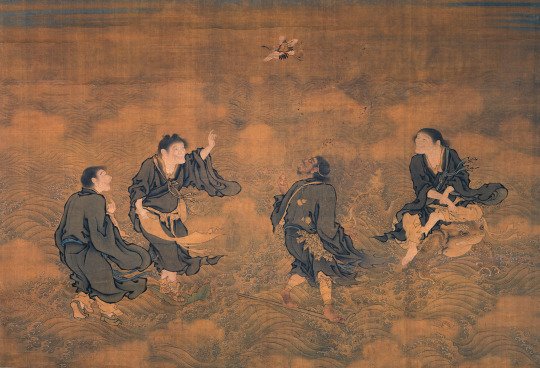
Four Immortals Saluting Longevity by Shang Xi (wikimedia commons)
The importance of the search for immortality grew during the Six Dynasties period. Seemingly in all strata of society a common reaction to frequent political turmoil was to seek solutions in Taoism and still relatively new Buddhism. This in turn left a huge impact on Chinese culture of this era as a whole. What is of particular relevance for this article is less the straightforward religious dimension of immortality, and more its reflection in literature. Works about immortals were already being written in the Western Han period, with the oldest surviving example being Liexian Zhuan (列仙傳) attributed to Liu Xiang, who lived in the first century BCE. Their importance only grew with time due to the aforementioned process, and they became a well established part of both poetry and prose. For example, a sixth century treatise on literary genres, Xiao Tong’s Selections of Refined Literature (文選; Wenxuan), pretty much the main source to fall back on in the study of pre-Tang literature, recognizes youxian (遊仙), literally “roaming into immortality”, as a distinct type of lyrical poetry. There’s a considerably degree of nuance to this term, since 遊 has the implications of leisurely, playful activity, but these lexical considerations are beyond the scope of this article. While in some cases the tales of immortals focused on figures primarily known for other reasons, like the Yellow Emperor, Chang'e or Laozi, many document the lives of historical pursuers of immortality instead. Well attested fangshi and Taoist masters appear in such a context, for instance Anqi Sheng or Liu An (according to a legend he ascended to heaven with his entire household, including dogs and other animals). The literary biographies, or rather hagiographies, of immortals often highlighted their personal eccentricities, tied to their detachment from society. The archetypal eccentric immortals are obviously the members of the group popularly known as the Eight Immortals, though this is a much later development, and the genre conventions formed centuries earlier. Literature about immortals is interesting from a modern perspective because at least in part it was arguably a secular pursuit. As secular as something could be prior to the rise of the modern notion of secularism, that is (see Mark Teeuwen’s article on Edo period secularism for some arguments against seeing secularism as an entirely modern phenomenon). This is not merely the modern perception, for clarity - the earliest statements to that effect can be found in works of literary criticism from the second century or so. The writers were chiefly scholars, courtiers and officials, not clergy, and naturally their works are not recognized as “canonical” Taoist literature. Some of these authors took the topic of immortals into rather peculiar directions. According to Xiaofei Kang, during the Six Dynasties period amorous encounters with female immortals (仙女, xiannü) were a “fashionable topic among literati”, while in the subsequent Tang period some authors compared courtesans they sometimes were actually involved with to immortals metaphorically. She notes that they effectively created a genre of works focused on immortals which was no longer really describing the pursuit of immortality, but rather “encounters with enchanting beauties, both real and imagined”.
Needless to say, the literature about immortals remained relevant in later periods, and new stories continued to be written under the reign of subsequent dynasties. Many can be found in Pu Songling’s famous Liaozhai (Strange Tales from a Chinese Studio). This collection was written in the Qing period and remains in wide circulation today as a literary classic.
Pu Songling’s tale of Qing’e: the origin of Seiga
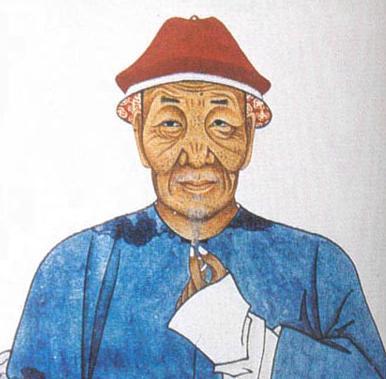
Pu Songling (wikimedia commons)
It is beyond the scope of this article to discuss all of Pu Songling’s tales about immortals, but there is one which necessitates further discussion, namely Qing’e, which is very obviously the basis for Seiga’s character. This makes her somewhat unusual among Touhou characters - while the story she is based on deals with religious themes, and fiction can shape religious views at times (as evidenced by the popularity of Sun Wukong or the image of hell in Divine Comedy), I found no indication Qing’e was ever views as anything but a literary character. Like the rest of Liaozhai, the Qing’e tale has been translated into English in the 2000s. Songling’s works have an older and more famous translation too, but it’s just a selection, and it has many issues, which you can read about here. You can read parts of the more modern translation on Google Books. Obviously it can also be found easily in other places. I will also summarize the story of Qing’e below for convenience. This is where the content warning I mentioned applies: the story is not very explicit, but there are is a scene of what I think counts as attempted sexual assault and other generally unsavory moments of that sort, so if that bothers you, skip ahead to the next section. The beginning of the story introduces a certain Huo Huan (霍桓) from Shanxi, a sheltered young man of unspecified age (he’s older than 13 but “ignorant of adult desire”, which is pretty vague). He lives in the same neighborhood as the eponymous Qing’e (青娥), a teenage daughter of a certain mr. Wu (武), who was apparently a devout Taoist. Qing’e secretly read through her father’s personal collection, developing an admiration for He Xiangu in the process. When mr. Wu left for the mountains to become an immortal, his daughter declared she will never marry. Her decision is presumably meant to mirror one of the versions of the tale of He Xiangnu, who reportedly attained immortality by remaining celibate and consuming mineral powders (granted, you can also find versions where her immortal career started when she was seduced by Lü Dongbin, but that does not match the story here).
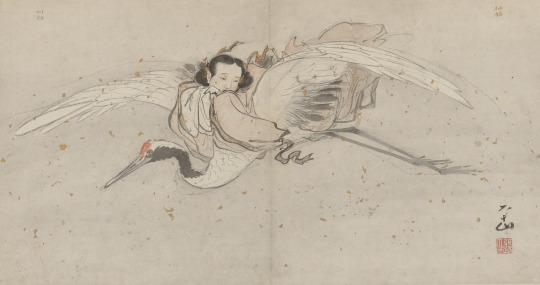
He Xiangnu by Zhang Lu (wikimedia commons)
Huan sees Qing’e outside at some point and, without really talking to her, decides she has to marry her and asks his mother to send someone to arrange that. she doesn’t think it’s a good idea, but eventually caves in. Lo and behold, it doesn’t work and the Wu family is not interested in the proposal. Huan then meets an unrelated Taoist, who offers him a magical tiny spade (one chi long) used to dig up Taoist-preferred herbs (a key component of the immortality keto diet), which can quite literally hack through stone. This convenient deus ex machina gives Huo the idea to hack through the walls of the Wu residence to see Qing’e. Note that the narrator does not approve of this plan, and calls it an “illegal act”. Alas, it comes to pass anyway, With this newfound power Huan watches Qing’e undress before she goes to bed and then listens to her breathing while she is asleep, as one does with women they saw exactly once before. Eventually he falls asleep himself on her bed. Needless to say, when Qing’e wakes up she is less than thrilled and summons her servants. They assume Huan is a thief, but he tries to explain himself. He’s set free, but the magical tool is confiscated. Since Huan does not know when to quit, he arranges for a second round of matchmaking afterwards. While apparently Qing’e is cautiously optimistic about it this time, her mother is less than thrilled after learning there are now holes in their residence’s walls. She insults the matchmakers, Huan and Huan’s mother. This in turn makes Huan’s mother angry. She apparently concludes that Huan and Qing’e had sex, and declares that instead of damaging her good name someone should’ve just killed them both on the spot. Qing’e is genuinely sad about this and sends a messenger to smooth things over. However, ultimately nothing really comes out of it. Some time later, Huan starts a career as a helper of his town’s magistrate, Ou. The latter is surprised to learn he is not married yet, and after hearing about his unsuccessful endeavors intervenes himself. With the help of other local officials he secures the permission of Qing’e’s mother, and the marriage is officially arranged. A year later, Qing’e arrived at Huan's home. She brings the magical tool with her, and declares that it is no longer needed. However, Huan decides to carry it with him as a good luck charm, pointing out acquiring it was what led to their marriage. Some time later newlyweds have a son, Mengxian, but Qing’e is not interested in raising him and entrusts that entirely to a nurse. After some more time, in the eighth year of their marriage, she announces to Huan that their time together is coming to a close, and there is nothing to be done about this. Shortly after that, she seemingly dies, and Huan and his mother bury her - or so they think, at least. In the aftermath of this event Huan’s mother falls sick, and inexplicably develops a craving for fish soup, which is hard to obtain in the area the story takes place according to the narrator. Huan, as a staunch believer in filial piety, decides to embark on a journey to procure some. He is initially unsuccessful, but he manages to get some from Wang, an old man he encountered in the mountains. The latter also offers to introduce him to a beautiful woman, but Huan is focused on the quest for fish soup and declines.

Contemporary Chinese fish soup (wikimedia commons)
With the power of fish soup Huan’s mother’s health is restored, and when it becomes clear she’s going to be fine he decides to seek Wang again. He does not find him, but after a long trek in the mountains he instead stumbles upon an unusual cave. Unusual because there’s a house inside it. a house which, as it turns out, is inhabited by Qing’e. Qing’e is surprised to see Huan. She explains that she faked her death and in reality a bamboo cane was buried in her place. She concludes that if Huan found her, they are presumably fated to be together as immortals. He is then taken to her father, who as established earlier also became an immortal. The initial reception is positive, but Huan makes a scene demanding that Qing’e have sex with him and keeps clutching her arm when she declines. Qinge’s father intervenes, and kicks him out for attempted sacrilege in his hermitage. Alas, Huan can’t get a clue as already established. He cannot see the house anymore because due to a trick there’s only a cliff in front of him after the doors close, but that’s not really enough to stop him, as he suddenly remembers he has the magical tool with him. He starts digging, and despite insults hurled at him from behind the rocks eventually makes a sizable hole in the cliff. At this point someone, presumably Qing’e’s father, gets fed up, and throws Qing’e out through the hole to get him to leave. Qing’e, to put it lightly, is not very keen on this turn of events. She nonetheless returns with Huan to his house. Shortly after that they moved elsewhere, to Yidu, where they lived for eighteen years. Qing’e at some point gave birth to a second child, a nameless daughter, who doesn’t really factor into the story. All we hear about her is that she married into a local family. Eventually Hano’s mother dies. Qing’e picks an auspicious location for her resting place, and tasks Huan and Mengxian with preparing the burial. A month later, she and Huan disappear, leaving the new adult Mengxian alone. In the final scene of the story, Megxian, who apparently spent the first twenty or so years of his adult life unsuccessfully attempting to pass the imperial examination, meets a certain Zhongxian, and is amazed to learn they bear the same surname. The two quickly realize they’re brothers, and decide to meet with their parents, but they fail to accomplish that since they left Zhongxian’s house in the meanwhile. The narrator comments that while Huan’s actions were “foolish” and “crazy”, everything he had striven for was granted to him as a reward for his filial piety, and then marvels why nobody stopped him and Qing’e from having more inevitably abandoned children. “That’s really strange,” he remarks.
Seiga’s character between ZUN’s innovations and Taoist tradition

Seiga explaining the powers of a hermit; if only there was a term which makes this explanation even more straightforward... (WaHH chapter 12.1)
As you’ve probably noticed, Seiga’s bio in the Ten Desires omake is remarkably faithful to the adapted source. Even her name is just a Japanese reading of the combination of Qing’e’s given name with the family name of her husband. It does not seem that everything unfolded identically in Touhou, though. There is no indication in the bio, or anywhere else for that matter, that Seiga went back after faking her death, and we instead learn that she decided to travel to Japan, since Taoist “hermits” were uncommon there. Additionally, Seiga presumably kept the confiscated chisel, since her ability, which she eagerly demonstrates in Wild and Horned Hermit, is rather obviously a direct reference to the tale of Qing’e. I will admit that while I do not question Pu Songling’s talent and enjoyed many of his tales, I think ZUN’s version is more satisfying than the original, perhaps because from a modern perspective Qing’e is arguably a more compelling protagonist than her husband, and Touhou effectively treats her as the main character in this story. Something that I believe is relatively well known is that Seiga’s entire character is a bit of an anachronism: to encounter Miko, she would need to be alive through the end of the Six Dynasties period already. However, since ZUN adapted much of the tale of Qing’e directly, like her forerunner she idolizes He Xiangnu, who according to legends about her was only born in the Tang period, and attained the status of an immortal in the early eighth century, during the reign of emperor Zhongzong - nearly a century after Miko’s semi-historical counterpart passed away. I do not think this mistake is meaningful. Save for the references to He Xiangnu and imperial examinations, the tale of Qing’e is set in a largely timeless world. I would presume it’s just a small mistake on ZUN’s part, and he didn’t check the chronology while summarizing the part of the story he wanted to use in Seiga’s bio. There is no need to ponder if Seiga’s power lets her travel in time, as the wiki (which, as we all know, prides itself in maintaining “neutrality” and enforcing correct exegesis of the source material, especially Hisami’s bio) does.
There is a further aspect of Seiga’s character which might evoke works about immortals, though I am not sure if this was intentional. As we learn from her entry in Symposium of Post-Mysticism, she “cannot become a celestial due to her personality, but that does not seem to bother her”. The term dixian which I already brought up before designated immortals who were not interested in ascension to heaven. According to Ge Hong, there were actually many benefits to such a fate, and while nominally a dixian ranked below a tianxian (in Touhou terms, a celestial), they had much more freedom. He states that the archetypal immortal Peng Zu, who spent over 800 years on earth, did so because the upper echelons of the heavenly hierarchy are occupied by well established deities, and any immortal joining their ranks would be burdened with tiresome tasks and obliged to act as servants, making their life less enjoyable than it would be on earth.

Peng Zu (wikimedia commons)
Poetry describing the earthbound immortals originally developed in the third and fourth centuries. Parallels can be drawn between their protagonists who reject the celestial bureaucracy with a different class of literary characters popular at the same period - non-conformist recluses who did not care about the mundane, earthly administration. The dixian is essentially a merge between the classical supernatural immortal and the archetypal hermit. This sort of immortality was a metaphor for unrestrained freedom first and foremost. I will stress again that I have doubts about whether ZUN was aware of this when he came up with Seiga, but it certainly does fit her well. Also, more recently, in Who’s Who of Humans and Yokai in Gensokyo he actually says that “she may be the most hermit-ish character here”. I’d hazard that even if he was not aware of this idea before, he probably is now, in some capacity at least. It’s not like Seiga’s status as a “wicked hermit” was ever tied to lack of interest in heaven, as opposed to necromancy, so this does not contradict anything established.
Reception of Chinese tales about immortals in Japan Obviously, ZUN is not the first person in Japan to adapt literature about immortals.Something that needs to be stressed before delving deeper into the topic is that transfer of beliefs, and especially tales, pertaining to immortals to Japan did not constitute the spread of Taoism as an organized religion. It is instead simply an aspect of the widespread adoption of elements of Chinese culture. While Taoist ideas were an aspect of this phenomenon, we know relatively little about how they were transmitted to Japan, though there was clearly no effort to introduce the religion itself in a formal manner the way Buddhism was. This topic ultimately can’t be explored here in detail due to space constraints. but most likely what occurred was gradual introduction of certain elements in informal contexts: through art, Buddhist borrowings or poorly documented individual ventures. The earliest recorded example of reception of motifs related to immortals in Japan is likely the tale of Tajimamori from the Nihon Shoki, which involves a quest for items granting immortality. The much better known tale of Urashima Taro, also preserved in this source, is another candidate, and as a matter of fact was recognized as an example of literature about immortals in the Heian period already.
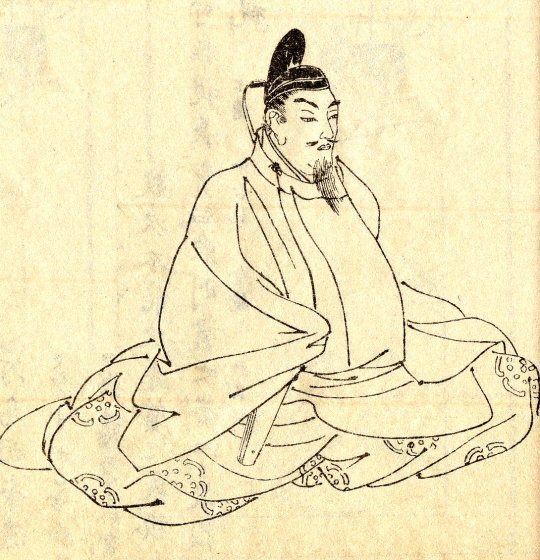
Ōe no Masafusa (wikimedia commons)
However, our main source of the early Japanese perception of immortals are not the early “national chronicles”, but rather Honchō Shinsenden (本朝神仙伝). Its author was Ōe no Masafusa (1041-1111), an official and scholar from the Heian period. His career culminated when he was appointed to the prestigious position of the governor of Kyushu, though he eventually abdicated to dedicate himself to writing. His work is classified as an example of setsuwa. At the same time it is also firmly tied to the already discussed tradition of Chinese secular immortal literature, and can effectively be considered an attempt at creating a Japanese equivalent of collections of biographies of immortals. Obviously it has its own unique peculiarities to offer too. Masafusa’s work presents an interesting case of fusion of the Taoist-influenced Chinese notion of immortality with Buddhist ideas: the immortals are compared to hijiri (Buddhist “holy men”) and “living Buddhas” (ikibotoke). This is not entirely a novelty, as while Buddhists are absent from Chinese compilations of biographies of immortals, Laozi’s ascent to immortality was nonetheless at times described in similar terms as Buddhist Nirvana, at least in sources from the fifth century. There was also a preexisting Buddhist tradition of legendary long-lived patriarchs awaiting the coming of Maitreya or simply extending their lifespans to save more beings. Therefore, while innovative, this combination of Taoist and Buddhist elements was hardly something unparalleled or contradictory. The selection of figures described as immortals in Honchō Shinsenden is also a bit different than in its Chinese forerunners. Legendary heroes and historical statesmen do show up, as expected. However, alchemists and members of Taoist clergy are missing, since they were not exactly common in Japan. Buddhist monks effectively replace them as the main social group among immortals, though it does not seem religious devotion is the deciding factor. Ultimately there is no clear pattern, not even that of virtuous life: Masafusa’s immortals as a group are not meant to be moral examples, even though some of them are portrayed as paragons of virtue. It seems ultimately what Masafusa wanted to do is present stories he personally found interesting or awe-inspiring, and there was no religious aim behind his work. Some of his choices were actually criticized as inappropriate by his contemporaries, in particular the inclusions of Zenchū and Zensan, who according to polemics were not immortals, but merely devout Buddhists taken into a Pure Land (a heavenly realm created by and inhabited by a Buddha) in their current forms, without reincarnation. This argument follows the well established aspect of esoteric Buddhist doctrine, which enabled the possibility of achieving enlightenment in one’s current incarnation. A total of thirty seven tales formed the original manuscript, though not all of them survive. They range from long, grandiose narratives about figures like Yamato Takeru and En no Gyoja to brief, almost comedic accounts of the tribulations of anonymous figures such as the “stick-beaten immortal” (who learned how to levitate, but only up to the height of one shaku, which meant that he could not even escape children hitting him with sticks) or the “old seller of white chopsticks” (whose title tells you a lot about his economic situation). Only two are ultimately important here, though: those of the semi-historical prince Shotoku, and the firmly historical poet, historian and eccentric Miyako no Yoshika. Simply put, I believe Honchō Shinsenden is responsible both for the portrayal of Shotoku as a Taoist immortal and for the inclusion of a character (vaguely) based on Miyako no Yoshika in Ten Desires.
Honchō Shinsenden’s Shotoku and Toyosatomimi no Miko
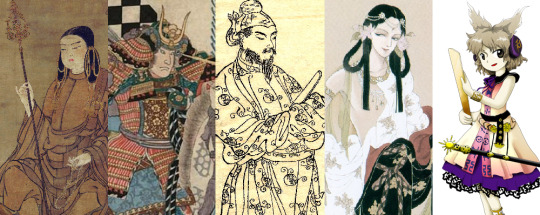
The image of prince Shotoku through the ages
Prince Shotoku (聖徳太子) is one of the highest profile figures to ever be portrayed in Touhou, and as such arguably requires no lengthy introduction. He purportedly lived from February 7, 574 to April 8, 622, and served as a regent on behalf of his aunt, empress Suiko. He is traditionally credited with spreading Buddhism in Japan, ordaining numerous monks, writing commentaries on sutras, vanquishing rivals such as Mononobe no Moriya with the help of the Soga clan, and so on. He might have not existed at all, or perhaps he did, but played nowhere near as major of a role in Japanese history as traditionally assumed. The academic debate started a few decades ago, and remains ongoing. Its outcome isn’t really important here, since regardless of Shotoku’s disputed historicity, he came to be well established both as a religious figure and as a literary character. At various points in time and for various people, Shotoku was, in no particular order, the ideal statesman, a manifestation of Kannon, a peerless military commander, a yaoi protagonist and, most importantly, an immortal. In Honchō Shinsenden, Shotoku is referred to as “prince Jōgu” (上宮), though we do get the mandatory Shotoku namedrop indirectly when his virtue (聖徳) is highlighted.. He is actually one of the two only of the listed immortals who can be classified at least vaguely as “statesmen”, the other being Yamato Takeru. For unknown reasons, Masafusa got some details wrong: according to him Shotoku’s father was Bidatsu. This view is unparalleled, and there is no real reason to doubt the conventional genealogy, which firmly positions him as a son of Yomei and his half-sister Anahobe no Hashihito. We learn that his birth was foretold by a dream in which his mother saw a golden figure who entrusted her with a child who will spread the dharma. This is in itself a combination of Taoist and Buddhist elements, seemingly an attempt at imitating a legend about the birth of Laozi, which in turn depended on a legend about the birth of the historical Buddha. Naturally, Shotoku already displayed supernatural abilities as a child. Masafusa reports that whoever touched him was imbued with a “lasting fragrance”. A variant of the well known tale which his Touhou counterpart’s name and ability reference is presented here too, though a key detail differs - Shotoku can listen to eight, rather than ten, people according to Masafusa. This is not unparalleled, and therefore probably isn’t a mistake unlike the unexpected genealogical change mentioned before. A major event from Shotoku’s life relayed by Honchō Shinsenden is an alleged meeting between him and Illa (Nichira), a Korean monk living in Japan. The historicity of this episode is debatable, as Illa died when Shotoku (if he was real in the first place, of course) was only eleven years old. He identifies the prince as the bodhisattva Kannon, and pays respect to him as such. In response Shotoku emitted a beam of light from between his eyebrows, which reflects both Taoist and Buddhist traditions about manifesting supernatural powers.
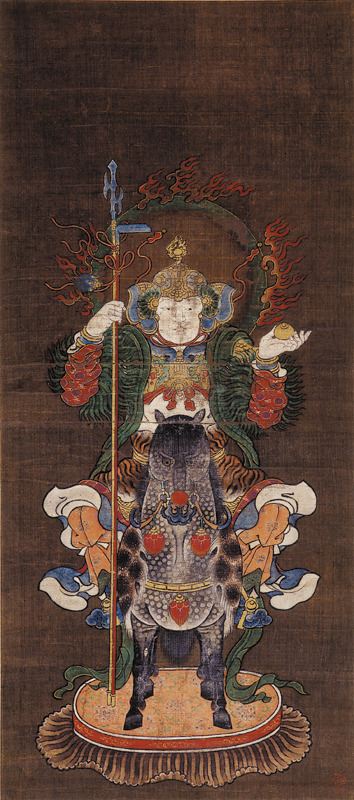
Illa's alter ego Atago Gongen (wikimedia commons)
Interestingly, Illa responds by doing the same, thus revealing his own supernatural character. We know from other sources that Illa could be identified as the true identity of Atago Gongen, the tengu-like deity of Mount Atago. Bernard Faure notes parallels can be drawn between his portrayals as a foreign supernatural ally of Shotoku and as the human alter ego of a deity with the traditions pertaining to Hata no Kawakatsu. There is also an “immortal of Mount Atago” in Honchō Shinsenden, but his identity is left unspecified. It's worth noting that in Symposium of Post-Mysticism Byakuren and Marisa at one point discuss the existence of “hermit-like tengu”. Illa truthers… we can make it happen if we believe strong enough… Jokes aside, I’m actually cautiously optimistic that Illa might some day end up being the first Korean character in Touhou, at least implicitly. Given the inclusion of references to Hata no Kawakatsu, odds are decent ZUN knows about him too.
In another anecdote, we are introduced to another member of Shotoku’s supernatural supporting cast, the black steed of Kai. This horse is credited with being able to travel the distance of a thousand ri in a single move. This is seemingly an adaptation of a Taoist motif too, as immortals were believed to favor traveling on supernaturally fast steeds, or in cloud chariots drawn by such animals, or to move instantaneously through other means. The fabulous distance of 1000 (or even 10000) ri is conventional, too.
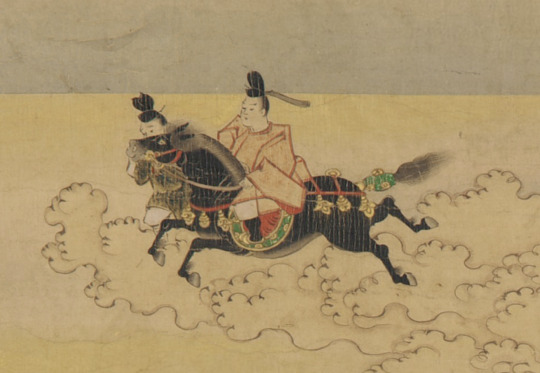
Shotoku traveling through the sky on his supernatural horse (Smithsonian Institution; reproduced here for educational purposes only)
Of course, the black steed (kurokoma) is also the very same horse that served as the basis for Saki. While allusions to this connection is probably the second most common genre of fanart of her, it surprisingly took ZUN four whole years to acknowledge it outside of a track title, specifically through two lines in the vs mode of Unlimited Dream of All Living Ghost. Time will tell if anything will come out of it, I’m personally skeptical seeing as we have yet to see a canon work do anything with the connection between Okina and Hata no Kawakatsu even though it was acknowledged in an interview. I hope I am wrong, though.
Shotoku’s various accomplishments are not described in detail, though Masafusa does bring up his famous seventeen articles constitution and the establishment of Shitenno-ji, and additionally states that teachings linked to the Yuezhi people from Central Asia were associated with it (unique opportunity to justify bringing Central Asian deities like Nana and Weshparkar into Touhou). The final and most important part of Shotoku’s biography, the circumstances of his death - or rather his acquisition of immortality - is only partially preserved. According to Masafusa, one day he simply informed his wife (presumably Kawashide no Iratsume, as opposed to one of the other three wives) that he cannot exist anymore in a “defiled” world and “transformed” himself. It is actually not explained how he even mastered the techniques allowing that, presumably because we are meant to attribute this miraculous feat to his status as a saintly Buddhist. The authors behind the most recent English translation, Christoph Kleine and Livia Kohn, suggest that in the lost final sentence(s) Masafusa might have combined the Taoist take on immortality with Amida’s pure land, but this is ultimately speculative. ZUN actually went for something closer to the Chinese model with Miko - she was explicitly taught by Seiga. The notion of immortals mentoring those they deem worthy to pursue the same path is a widespread motif, and even some of the Eight Immortals gained their status this way. This idea is absent altogether from Honchō Shinsenden, perhaps since it was tied to formal transfer of Taoist teachings. While this is an innovation, I would argue it’s still true to Shotoku legends, considering they are already filled with miracle-working visitors from distant lands, from Illa and Hata no Kawakatsu to considerably more famous Bodhidharma.
From eccentric to immortal: the literary afterlife of Miyako no Yoshika

Miyako no Yoshika (wikimedia commons)
As I already said, the second tale from Honchō Shinsenden relevant to Ten Desires is that focused on Miyako no Yoshika. He obviously shares no direct connection with prince Shotoku. Or with Qing’e, for that matter. Unlike prince Shotoku, he left a solid paper trail behind, and there’s no doubt that despite having quite a career as a legendary figure, he was originally a historical person. He lived from 834 to 879, in the Heian period. He was a calligrapher, a poet, an imperial official and for a brief time even an assistant to the envoy to Bohai (Balhae). The inclusion of a character based on him in Ten Desires might seem puzzling at first glance, since none of this seems particularly relevant to the game, and Yoshika’s omake bio doesn’t say much that helps here, beyond calling her a “corpse from ancient Japan”. However, I believe Honchō Shinsenden sheds some light on this mystery. In Honchō Shinsenden, Miyako no Yoshika belongs to the small category of literati pursuing immortality, a status he only shares with Tachibana no Masamichi. There are a number of other immortals listed who are neither monks nor statesmen, and can be broadly classified as laypeople, though none of them seem to have much to do with those two. In contrast with figures like prince Shotoku, described as pious sages, the fictionalized take on Yoshika is meant to highlight extreme eccentricity instead. This is an element common in accounts of Chinese immortals’ lives too, as I highlighted before. You might also remember this topic from the Zanmu article from last month. As we learn, Yoshika, who was originally known as Kuwahara (misread by Masafusa as Haraaka, an actually unattested surname) no Kotomichi but changed first his family name (for unknown reasons) and then also his given name because of a poem he liked, decided to become an immortal under rather unusual circumstances. In the very beginning of his career, after spending a night with the concubine of an official from the Bureau of Examination who was meant to examine him the next day, Yoshika decided that his goal in life should be to become an “eccentric immortal”. He passed his official exam without any trouble, with an unparalleled score. Graffiti in the academy he attended proclaimed him the “world’s greatest maniac” (so he comes prepackaged with a Touhou-appropriate title). He attained widespread acclaim for his wit and poetic skill. In his free time, he engages in celebrated literati pastimes such as drinking and sleeping with courtesans (Masafusa does not specify if he wrote about that, like his Tang counterparts did).
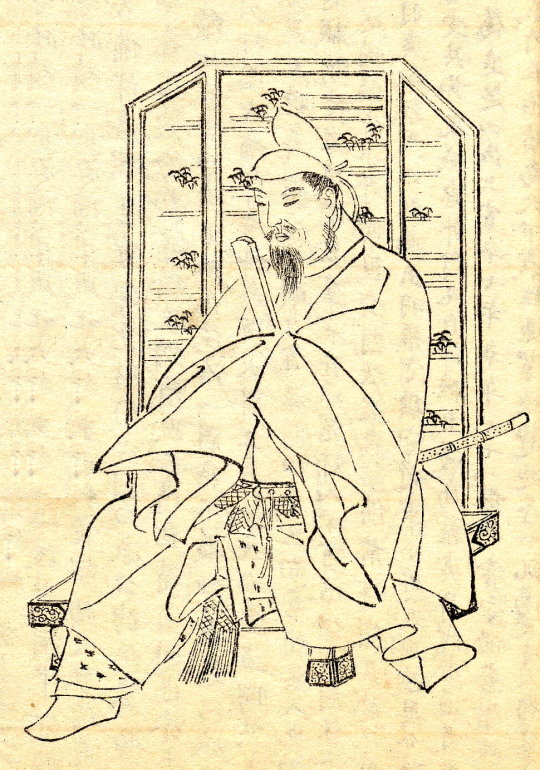
Sugawara no Michizane, Yoshika's apparent nemesis (wikimedia commons)
Alas, Yoshika’s career ultimately did not go entirely according to his whims. The beginning of the end was the day when he acted as the examiner of a new rising star, Sugawa no Michizane. The latter has proven himself to be even more skilled than him, and eventually rose to a higher rank than Yoshika. The latter could not bear this perceived offense against him and one day left his life behind to return to the pursuit of immortality. He aimed at the mountains, hoping to find immortals there to learn their techniques. Masafusa does not provide much detail about his further life, but states that after many journeys he evidently accomplished his goal, as he was purportedly seen alive and well a century after his alleged death.
It’s worth pointing out here that this course of events follows a Taoist motif: becoming disillusioned with one's own career, or with earthly affairs in general, is a common catalyst for search of the Taoist way in literature. A point can actually be made that of all the immortals in the Honchō Shinsenden is the most quintessentially Taoist one (despite not actually being a Taoist), the most direct example of the Chinese model being adapted for a Japanese historical figure, with no addition of the Buddhist components. He even resembles the typical image of a Tang scholar-bureaucrat invested in search for immortality just as much as in amorous adventures. This arguably makes him the perfect basis for a character in a game centered on Taoist immortals in Japan, though truth to be told I feel that in contrast with Seiga and Miko, ZUN’s Yoshika does not live up to her forerunner.
Legends about Miyako no Yoshika in other sources, or the remarkable poetic career of Ibaraki-doji
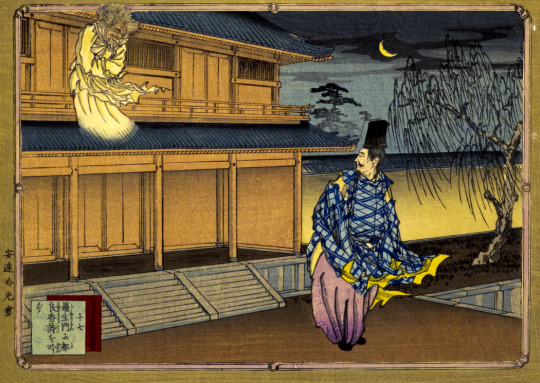
The oni of Rashomon and Miyako no Yoshika, as depicted by Ginko Adachi (Yokohama Art Museum; reproduced here for educational purposes only)
Some of you might wonder where Ibaraki-doji fits into this, considering the pretty direct reference to Yoshika's poetry in Wild and Horned Hermit. Masafusa, as a matter of fact, does allude to one more legend while highlighting Yoshika’s poetic talent, though he doesn’t go into detail. There’s no direct supernatural encounter - a nameless demonic inhabitant of Kyoto’s gate only hears a poem from passersby marveling at it and becomes “deeply moved”, but that’s it. The name Ibaraki-doji doesn’t show up at all, and there’s no mention of the oni finishing the poem, which is a mainstay of later versions. Another of Masafusa’s works, Gōdansho (江談抄), also doesn’t use the name Ibaraki-dōji, or mention an actual encounter between Yoshika and the oni - he merely hears an unnamed passerby hum the poem and comments on it, calling it touching. However, the Kamakura period collection Jikkinshō already presents the version which gained the most traction in the long run, with the poem being a collaboration between Miyako no Yoshika and an oni. He later recites the full composition to Sugawara no Michizane, who is correctly able to point out only some of it is Yoshika’s own work, while the rest was added by an oni. However, once again, the name Ibaraki-doji is nowhere to be found. On the other hand, while the story of Ibaraki-doji can be found in Taiheiki and other similar sources, it takes place far away from the capital in these early versions. The location was changed in noh adaptations of the legend to Rashomon, presumably due to its preexisting associations with supernatural creatures. By the time Toriyama Sekien published one if his famous bestiaries, Konjaku Hyakki Shūi, it seems the idea that the oni inhabiting this gate who was encountered by Yoshika and Watanabe no Tsuna’s nemesis Ibaraki-doji, who fought him there, were one and the same was already well established. Note that Sekien’s description of the oni of Rashomon actually doesn’t use the name Ibaraki-doji, though we do know he was aware of it. It’s worth noting that the oni of Rashomon seemingly had a broader interest in fine arts, since there is also a legend in which he meets the famous biwa player Minamoto no Hiromasa and shows him his own skills with this instrument. However, this is ultimately not directly relevant to Yoshika, so you will have to wait until the next article, which will cover Shuten-doji and Ibaraki-doji in detail, to learn more.

The oni of Rashomon, as depicted by Toriyama Sekien (wikimedia commons) Bibliography
Bernard Faure, From Bodhidharma to Daruma : The Hidden Life of a Zen Patriarch
Xiaofei Kang, The Cult of the Fox: Power, Gender, and Popular Religion in Late Imperial and Modern China
Zornica Kirkova, Roaming into the Beyond: Representations of Xian Immortality in Early Medieval Chinese Verse
Christoph Kleine & Livia Kohn, Daoist Immortality and Buddhist Holiness: A Study and Translation of the Honchō shinsen-den
Michelle Osterfeld Li, Ambiguous Bodies. Reading the Grotesque in Japanese Setsuwa Tales
Masato Mori, "Konjaku Monogatari-shū": Supernatural Creatures and Order
Masuo Shin'ichirō, Daoism in Japan (published in Brill’s Daoism Handbook)
Leslie Wallace, Betwixt and Between: Depictions of Immortals in Eastern Han Dynasty Tomb Reliefs
309 notes
·
View notes
Text
I think it'd be fun to sort of liveblog looking for countries that haven't abused/exiled Jews
I haven't found a list. So I'm making one.
Let's start with China. China has Jewish communities, and maybe not enough of them to become a target! The perfect amount?
Wow, Jews have lived in China since the 7th century CE. I've heard of the Kaifeng Jews!
Oh, this is ominous: "In the first half of the 20th century, thousands of Jewish refugees escaping from pogroms in the Russian Empire arrived in China. By the time of the establishment of the People's Republic of China in 1949, only a few Jews were known to have maintained the practice of their religion and culture."
Wow, fun fact:
According to an oral tradition dictated by Xu Xin, Director of the Centre for Judaic Studies at Nanjing University, in his book Legends of the Chinese Jews of Kaifeng, the Kaifeng Jews called Judaism Yīcìlèyè jiào (一賜樂業教), lit. the religion of Israel. Yīcìlèyè is a transliteration and partial translation of "Israel".
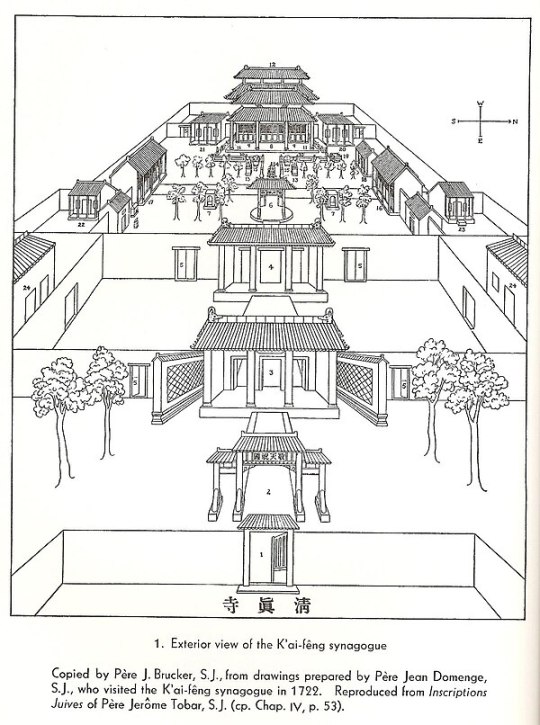
Surprising and cool:
Famous Venetian traveler Marco Polo, who visited China, then under the Yuan dynasty, in the late 13th century, described the prominence of Jewish traders in Beijing.
Neither surprising nor cool:
Genghis Khan called both Jews and Muslims Huihui when he forbade Jews and Muslims from practicing kosher and halal preparation of their food, calling both of them "slaves" and forcing them to eat Mongol food, and banned them from practicing circumcision.
In the late 1800s a lot of Jews emigrated from India and Iraq to China; they "took a considerable part in developing trade in China, and several served on the municipal councils."
In the early 1900s, 20,000 Jewish refugees from Russian pogroms emigrated to Harbin, in northeast China and "and played a key role in the shaping of local politics, economy and international trade."
Surprisingly:
Dr. Sun Yat-sen, founder of the Republic of China, admired the Jewish people and Zionism, and he also saw parallels between the persecution of Jews and the domination of China by the Western powers. He stated, "Though their country was destroyed, the Jewish nation has existed to this day ... [Zionism] is one of the greatest movements of the present time. All lovers of democracy cannot help but support wholeheartedly and welcome with enthusiasm the movement to restore your wonderful and historic nation, which has contributed so much to the civilization of the world and which rightfully deserve [sic] an honorable place in the family of nations."
Wow. It really doesn't go into any more detail about the SMALL gap between "40,000 Jews moved to China from 1845-1945," and "most of these Jews emigrated to Israel or the West... by the time of the establishment of the People's Republic of China in 1949, only a few Jews were known to have maintained the practice of their religion and culture."
That's four years.
Let's look at other sources.
At first, life in Shanghai was peaceful for its newest residents. The Jewish refugees were welcomed by Shanghai residents and they created a strong community with schools and a vibrant social scene. Some refugees began working as dentists and doctors, while others set up shops, cafes and clubs in the neighbourhood.
What the refugees couldn't foresee was they would travel across the globe only to fall into the clutches of the Nazis' most powerful ally. In 1941, Japan seized Shanghai. Acting under instruction from the Nazis, Japanese troops rounded up all of the city's Jews and confined them in Tilanqiao. Shanghai's Jewish ghetto had been born....
According to [historian Dvir] Bar-Gal, even prior to the Japanese invasion, many Jewish refugees in Tilanqiao lived in poverty compared to their comfortable lifestyles back in Europe. Conditions worsened greatly after Japanese soldiers gathered Jews from across Shanghai and forced them to all live within the borders of this newly formed ghetto. Jews were banned from leaving the area, even for work, unless they received permission from Japanese officers, which rarely happened.
Disease and malnutrition plagued the many heinously overcrowded group homes. "It went from a poor neighbourhood to an extremely poor neighbourhood," Bar-Gal said. "Many people had no jobs and lived in communal housing with many other beds and common bathrooms and kitchens. They had zero privacy and almost no food."
Yet, while six million Jews were murdered during the Holocaust, and up to 14 million Chinese soldiers and civilians were killed during their nation's war with Japan from 1937 to 1945, the majority of Shanghai's Jewish refugees survived. This remarkable feat was described by Holocaust historian David Kranzler as the "Miracle of Shanghai", and according to Bar-Gal, they survived because Jews weren't a primary target of the Japanese forces.
In 1945, when World War Two ended with the defeat of Japan and Nazi Germany, Japanese troops retreated and most of Shanghai's Jews quickly left, relocating to places like the US, Australia and Canada. But had Shanghai not taken these refugees in, many of these more-than-20,000 Jews may have never survived the Nazi death squads....
The first structure I came across was the imposing old Tilanqiao Prison. During World War Two, the Japanese incarcerated dozens of Jewish refugees and Chinese dissidents behind its thick stone walls. The brutality of the Japanese gave the Jews and the Chinese a common enemy and a shared experience. This connection remains strong, according to Tian.
That still leaves at least another 20,000, though? (I would say almost 20,000, but for the ones who already lived in China.)
Hmm. Here's a paper that says Jews "not only took part in the revolution but had also helped igniting it and then stayed on or joined later. While dealing with this puzzle in my paper, I’ll try to offer a typology of Jewish activists and revolutionaries in China, to explain their motives (by choice or not), and to evaluate their contributions in perspective. It appears that their Jewish identity did not play a direct role in their revolutionary activism, but it did play an indirect role. Included in this study are Grigorii Gershuni, Grigorii Voitinski, Boris Shumiatsky, Michail Borodin, Adolf Joffe, Pavel Mif, David Crook, Sidney Rittenberg, Israel Epstein, Sidney Shapiro, Solomon Adler, Sam Ginsbourg, Michael Shapiro, and more. Their main value to the revolution was mainly writing, translation, communication and publication. Although they were all deeply committed to the Chinese Communist revolution, some of them were jailed – for years – and occasionally more than once. Nonetheless, they continued to believe in, and even to justify, the Chinese Communist Party."
Wait, waaaaait. I was about to try to find the full paper (titled "Combining contradictions: Jewish contributions to the Chinese revolution"), but I ran across this first:
A century ago, the Communist International and the then-Russian Communist Party dispatched several agents to help foment revolution in China, including Russians like Grigori Voitinsky and Vladimir Neiman-Nikolsky and the Dutch Communist Henk Sneevliet. In addition to their shared commitment to Communism, all three were of Jewish heritage.
O rly??
They came with SKILLS!
On the evening of July 30, less than a month after the founding of the Communist Party of China (CPC), members of the CPC’s First National Congress met for a vote on a new party program. Suddenly, an unfamiliar middle-aged man barged into the meeting hall. “Sorry, I’m in the wrong place,” the man declared before hurrying off.
Sneevliet, well-versed in the techniques used by the police around the world to crack down on revolutionary activities, suggested that the meeting be adjourned and urged members to leave. By the time police arrived 10 minutes later, the building was already cleared out.
If you think that's impressive, try this!
Richard Frey... was an Austrian Jew who fled to Shanghai in the late 1930s. He worked for a hospital in the city until 1941, when he moved to a Communist military base in North China to teach medicine. In 1944, Frey was transferred to the central Communist base in Yan’an in China’s northwest Shaanxi province, where he soon succeeded in producing a crude but much-needed form of penicillin.
He just. Made up his own penicillin for them.
What the entire fuck.
HERE we go!
International Journal of China Studies, December 2020. "Combining Contradictions: Jewish Contributions to the Chinese Revolution," by Yitzhak Shichor, University of Haifa and Hebrew University of Jerusalem.
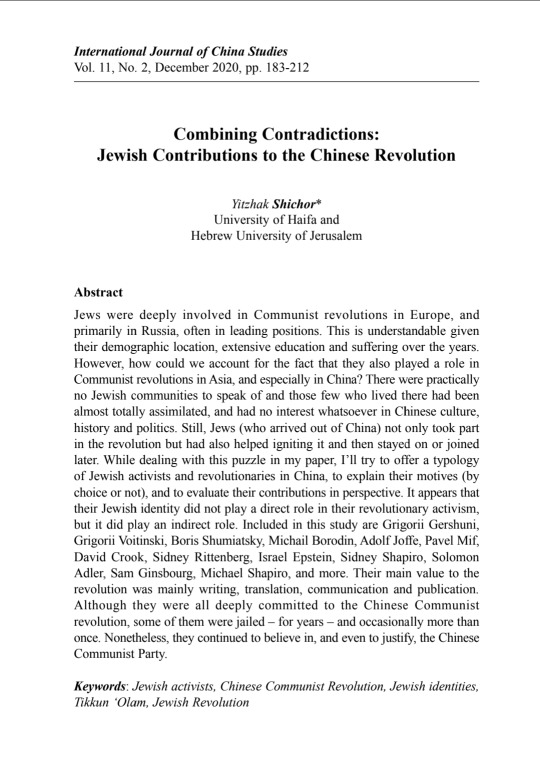
Fun Fact:
Jewish Lithuanian activist Grigory Gershuni emigrated from Russia to China by hiding in a barrel of sauerkraut.
Yeah okay, I think China's number one on the list of Hey, Some Countries Didn't Try That!
Next time: Japan? Or Brazil? Hmmmm.
32 notes
·
View notes
Text
Kai as Black Tortoise of the North

The Black Tortoise (also known as:"Xuanwu" or "玄武") is one of the five celestial guardians in Chinese mythology. She represents the cardinal direction of the north, the winter season and the element of water from the five elements. She is sometimes referred to as "Mysterious/Black Warrior" due to her shell resembling a shield. She symbolizes, longevity, immortality, protection, knowledge & wisdom. One legend says that she's a creation from the Dark Warrior's (the Chinese god she shares the same name with) stomach. The intestines from the Dark Warrior results in the creation of a snake, Xuanwu's mate. For those wondering why Kai's own snake isn't present, don't worry! Y'all have already met her. Another legend about the Black Tortoise says that she is created by the creation goddess, Nuwa. Nuwa uses the Black Tortoise's limbs to stabilize the sky-thus being a bridge to the celestial & Earth realm.
Since tortoises often bask in water for hydration, the Black Tortoise has the ability to manipulate water. Due to tortoises being known to hibernate in winter, the Black Tortoise can manipulate winter & snow at will. She can also wield magic to protect the defenseless and repel dark energy. As the Black Tortoise and the snake are generals to the god she shares the same name with, she also wields immense martial arts force-making her an icon for martial artists. The snake accompanying Xuanwu symbolizes power. Together, their typical embracing position symbolizes a harmonious yin and yang balance.
The Black Tortoise was notably popular during the Ming dynasty. Her imagery (along with the snake) was often found in tombs, palaces and temples. In literature, she serves a role in "Journey to the West". In "Journey to the West", after Xuanwu created the Black Tortoise & the snake, the two beasts immediately went on a violent rampage at a nearby village, only to be stopped by their creator. To atone for their sins, the Black Tortoise & the snake vowed to be generals to their creator.
One of the most notable traits Kai and the Black Tortoise share together is immortality. Specifically, the Black Tortoise is thousands of years old while Kai is over five hundred years old. Both of them went through change after gaining immortality. The importance immortality has to the Black Tortoise emphasizes the slow & steady wisdom nature of the creature. Kai's immortality serves as a determent to his psyche due to refusing to let go of his grudge against Oogway. Another aspect Kai and the Black Tortoise share together is their role as war generals. One of the reasons the Black Tortoise became a war general is because she genuinely wants redemption. From what we can infer from Kung Fu Panda 3, Kai most likely became a war general for the fun & thrill of it.
Interestingly, Kai and the Black Tortoise serves as an inverse to each other. Notably, the Black Tortoise offers good luck & prosperity to others while Kai is all about taking chi from others. The Black Tortoise remains remembered by numerous generations for having significant Chinese cultural influence still to this day and even beyond China itself. In contrast, Kai is obsessed with having a legacy but yet ends up being forgotten and erased in history. As it is stated earlier that the Black Tortoise once partakes in a violent rampage on at village. However, she redeems herself by promising to devote her life as a general to her creator. Meanwhile, Kai was a war general who have taken countless lives. He also once went haywire with stealing other's chi. Unlike the Black Tortoise, Kai bears zero remorse for his actions & in fact became worse after being sealed away by Oogway.
As a celestial guardian, Kai serves as a patron of warriors & martial artists. He especially is the second command to Xuanwu as his tactician. In his youth, he was a lot more self-absorbed & boastful about his victories. Over time, his conceited attitude became less apparent. Despite having some sense of mellowness, he never loses his pride for what he does for mortals. Unlike his original counterpart, Kai and his numerous nicknames & titles are well-known across China. In fact, he gains gratification for being the biggest of the celestial guardians & loves that his size is an easily noticeable physical trait of his. He enjoys hanging out among mortals & and narrates stories about his experience as a war general.
-Relationship with celestial guardians-
Po, the Yellow Dragon of the Center:"A man I'll gladly consider to be one of my best pals! My respect for him is just as big as that infinite pit stomach of his! He knows how to make an old man like me energetic! It's a relief whenever it's winter and he can use his powers to create more sun instead of having to always use firewood. We sometimes spar together, hang out at taverns and play mahjong together! I win most of the time. At first, I found it insulting for someone so young to somehow be more superior than me! I'm close to Nuwa! However, Po has done a great job to prove me wrong. Overall, he's a pretty great guy."
Chameleon, the Azure Dragon of the East:"Ah, the most drop dead gorgeous reptile I've ever laid my eyes on. My wife who I'll forever love for life, she's so...*snorts*small! I like teasing her about her puny size-she's so adorable fuming with rage! Sometimes, we butt heads here and there and boy-she has a lot of fury for someone her size. *ahem* In all seriousness, on our best days, we can be quiet next together & it'll make my entire day. I like talking to her as she rides on either of my shoulders while we go somewhere together. She also gives me the best massages and ear rubs! To sum up everything, this universe ain't big enough to contain all my love, respect & admiration for her altogether."
Shen, the Vermilion Bird of the South:"Hehe, I find it funny to push the fire chicken's buttons. That squawk sound he makes whenever he's embarrassed is especially hilarious. Sometimes, I like using one of his feathers to start fires for stuff and sitting on his tail during wintertime. Obviously, fire and water don't mix. Hold on-actually, we occasionally play xiangqi together (me of course having slightly more victories than him). I mainly like him because he can be funny whenever he's mad."
Tai Lung, the White Tiger of the West:"I gotta say, he has some amazing martial arts prowess. A fantastic warrior spirit that can't be found in any other warrior-it shines a ton whenever we spar together! His metal weapon craftsmanship is pretty impressive. Sometimes we'll challenge each other to drinking contests. I win most of the time. The many feats he accomplished as a warrior so far, I can't help but respect him! He's the biggest loner out of all of us, but we get along well."
<<Chameleon as the Azure Dragon of the North | Shen as the Vermilion Bird of the South>>
Sources:
https://archive.shine.cn/sunday/now-and-then/Chinas-guardians-of-the-galaxy/shdaily.shtml
https://www.cits.net/china-travel-guide/four-mythological-creatures-in-china.html
https://mythlok.com/xuanwu/
https://www.teenagemutantninjaturtles.com/2013/12/26/turtles-folklore-chinese-mythology/
https://www.onmarkproductions.com/html/ssu-ling.shtml
https://medium.com/@musespells/tortoises-turtles-in-mythology-ba0209f654e2
17 notes
·
View notes
Text
FAN XIAN TRANSLATING AMARTYA SEN'S CONCEPTS OF FUNCTIONINGS AND CAPABILITIES IN QING DYNASTY CONTEXT periodtttt girl ate and left no crumbs
12 notes
·
View notes
Photo






Tiger-leopard with a sorrowful guy in the mouth.
A tiger pattern wine vessel (yǒu 卣) of the Shang Dynasty. Unearthed at the junction of Anhua (安化) and Ningxiang (寧鄉) in Hunan. In Sen-oku Hakukokan (泉屋) Sumitomo collection since 1903.
Photo: ©和光同程travel
#chinese art#ancient china#chinese culture#shang dynasty#shang#shang bronze#tiger#leopard#cat#cats#cats posting#bronze#bronze art#bronze vessel#bronze design#sacrifice#chinese vase#felines#feline
140 notes
·
View notes
Text

SAMEDI 11 JANVIER 2025 (Billet 1 / 3)
Nous vous avions dit mercredi dernier que nous allions vous parler d’un peintre chinois, Yin Xin, qui a décoré une chapelle à Notre-Dame dédiée à Saint Paul Tchen. Elle est située pas très loin de l’entrée, sur la droite, juste au niveau de la boutique.
C’est Marina qui voulait la voir car elle avait lu un article dans le Figaro Magazine qui lui était consacré. Bien sûr cette chapelle n’est qu’un tout petit détail dans tout ce qu’il y à voir lorsque vous serez sur place. Mais « l’histoire » est belle (et émouvante pour le Saint) et nous avons pensé qu’elle méritait bien un Billet.
______________________________
« YIN XIN »
Yin Xin est un artiste chinois. Ce peintre, qui a grandi dans un pays communiste, s’est découvert un talent inattendu pour l’art sacré. Une passion qu’il a embrassée avec une telle fougue qu’elle l’a conduit à récolter l’honneur de voir deux de ses toiles figurer en exposition perpétuelle au cœur de l’immense cathédrale Notre-Dame de Paris.
Ses portraits à l’huile de saint Paul Tchen et de la Madone sont de véritables miraculés. Accrochés depuis 2018, ils ont été épargnés par les flammes de l’incendie qui avaient ravagé l’édifice en avril 2019. Gardés et exposés au Musée du Louvre pendant cinq ans, ils ont repris leurs quartiers au sein de la cathédrale après sa restauration. « Toute cette aventure est un miracle », s’exclame avec enthousiasme Yin Xin, conscient de l’exceptionnalité de son destin.
Son histoire est un roman. Yin Xin est né en 1959 dans une Chine fermée, arriérée et communiste ; il a grandi à Kachgar, au fin fond du désert de Gobi, où ses parents ont été envoyés de force par le régime pour travailler, après le départ de Tchang Kaï-chek. Une vie d’exil, de travail et de privations.
« Enfant, j’aimais le dessin et la peinture. J’ai alors peint mais uniquement en reproduisant les images de la propagande communiste pendant la Révolution culturelle. À l’époque, je n’en saisissais pas pleinement le sens. Mais j’étais conquis par les couleurs du pinceau. » Yin Xin s’engouffre dans cette seule voie autorisée, l’unique manière d’exprimer sa fibre artistique sans savoir jusqu’où elle allait le mener.
Une passion qui le conduira, justement, à des milliers de kilomètres. Yin Xin parvient à quitter la Chine et arrive en France en 1990, où il intègre les Beaux-Arts.
« Je me suis mis à voyager énormément pour me nourrir et découvrir le monde. À Paris et à travers le pays, j’allais dans tous les musées et voir toutes les expositions. » Il apprend les techniques, il est fasciné par des maîtres comme Le Caravage, Georges de La Tour.
Son destin se joue à la faveur du hasard et des rencontres. Une administratrice de la cathédrale Notre-Dame de Paris remarque son travail et lui propose une commande. Presque incrédule, il accepte et exécute alors les portraits de la Vierge et de saint Paul Tchen.
« J’ai grandi dans un pays où la religion était considérée comme l’opium du peuple. Quand j’ai accepté cette commande pour Notre-Dame, j’ai pensé que même si nous ne pouvions pas choisir notre naissance, il m’était maintenant donné de choisir ma foi. Je réalise que toutes les expériences de ma vie, mes études, mes dessins, mes explorations, mes voyages, mes revers et mes succès ne tendaient qu’à l’aboutissement de l’œuvre que j’ai le bonheur de réaliser aujourd’hui. »
(Source : « Le Figaro Magazine du 3 janvier 2025 »)
______________________________
Relisez lentement le dernier paragraphe, la litote de Yin Xin est superbe !
Nous ne connaissions absolument pas ce peintre et encore moins le Saint chinois dont il est question.
Heureusement il y a Wikipédia. Le destin du jeune-homme est tragique et pas que le sien. Vous trouverez ci-dessous sa courte histoire.
_________________________________
Paul Tchen est un Saint martyr catholique chinois, né le 11 avril 1838 à Sintchen (Chine impériale – Dynastie Qing) et décapité à Qingyang le 29 juillet 1861. Devenu séminariste, il est condamné et exécuté. Ses restes ont été rapatriés en 1920 et reposent maintenant à la cathédrale Notre-Dame de Paris, dans une chapelle qui porte son nom.
Il naît dans une famille non-chrétienne et il est évangélisé par l'école de l'Œuvre de la Sainte-Enfance. Il entre en 1853 au petit Séminaire où il commence à apprendre le latin. Il est baptisé le jour de Noël 1853 et fait sa première communion quelques mois plus tard.
En 1857, son père lui demande de quitter le Séminaire et ses études, mais il refuse. En 1860, il entre au grand Séminaire de Tsingay. A 23 ans, au printemps 1861, il est arrêté et décapité le 29 juillet avec un autre séminariste, Joseph Tchang, ainsi qu'un laïc fermier, Jean-Baptiste Lô et la cuisinière du séminaire, la veuve Marthe Wang, qui avait apporté de la nourriture aux trois prisonniers. Le Séminaire est incendié ensuite par les soldats.
Il est béatifié en 1909 par Pie X et canonisé le 1er octobre 2000 par Jean-Paul II.
(Source : « wikipedia.org »)
_______________________________
Nous aurions bien voulu savoir ce que signifie les sinogrammes qui encadrent le tableau de la Vierge. Si vous avez des infos à leur sujet, nous sommes preneurs.
NB La photo ci-dessus est un scan de l’illustration de l’article du Figaro Magazine, les 4 ci-dessous sont des photos personnelles.




3 notes
·
View notes
Text

Now after the mail not coming for an entire week, I own half of the Girls of Many Lands dolls. On the left is Chou Spring Pearl, representing Qing Dynasty China. On the right is Neela Sen, representing India’s fight for independence.
Both dolls are in great shape, though Spring Pearl’s stand is very discolored.
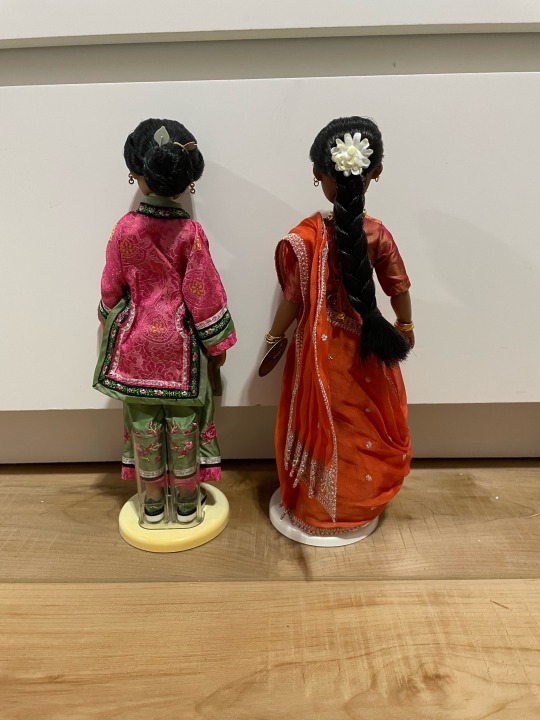
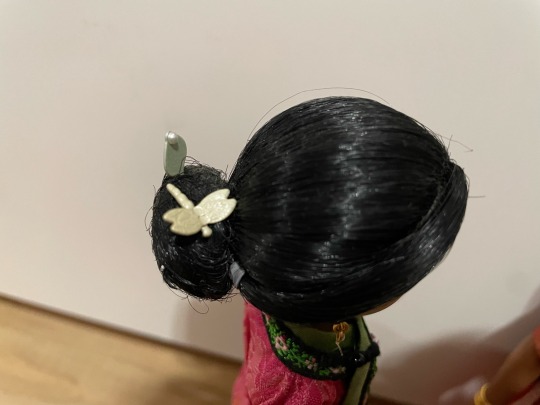

15 notes
·
View notes
Text

Feibo Girl
Shanghai, China
For much of China, the phrase “Roaring Twenties” may have a less jovial meaning. While the U.S. is in the middle of its Jazz Age, China is in the middle of its Warlord Era. The end of the Qing Dynasty has seen China is split into waring fractions called cliques, with those living in the country suffering the worst violence. It’s an especially dangerous time to be a woman.
Fortunately, the Fa family lives in Shanghai, where the wars usually aren’t as close, and women’s rights are blossoming. Heavy with Western influence, the neon-lit city is “the cosmopolitan Paris of the East.” It’s an even blend of old and new. Ancient-looking ships sail past modern skyscrapers, and pedestrians push wooden carts next to buses and trollies. [Link] It’s a good thing the women of Shanghai have more opportunities, because the warlords impose high taxes on their people, and ill veteran Fa Zhou can no longer work. His wife brings in some money sewing trendy qipaos, but it’s not enough to cover necessities and the warlord’s taxes. So Mulan takes it upon herself to save her family from financial ruin.
She first tries getting a job at a cabaret called the Lucky Cricket. Her mother and grandmother help give her the makeover needed to transform Mulan into a winking Feibo Girl—a Chinese flapper. Then, hesitantly, Mulan bobs her hair using a long, sharp family heirloom. But despite her best efforts, Mulan’s clumsiness clashes with the cabaret owner’s inability to listen, resulting in a show that entertains everybody for all the wrong reasons. While the patrons laugh wildly and snark that the performer is “on fire,” the literally inflamed owner loudly fires Mulan.
Ashamed, Mulan sits in the family’s garden, deep in thought. Near an opened window, Grandma belts out to American jazz on the radio. Grandma’s dance session is interrupted by an announcement from Dr. Sun Yat-Sen, a political and military leader seeking to reunite China and put an end to the warlords. He is recruiting soldiers for what he calls “the Northern Expedition.” Mulan—athletic, strategic, crafty, and often mistaken for a boy—perks at the announcement.
Ling, Yao, and Chien Po giggle behind their fans as Zongchang boasts of his supposedly enormous masculinity. Meanwhile, Mulan and Shang quietly move to free the captured Dr. Sun Yat-Sen. Along the way, they rescue another prisoner, from Zongchang’s kitchen; the Dog Meat General’s name has several possible meanings, but he does indeed enjoy certain canine dishes. Mulan saves an energetic pup from the butcher, and names him Little Brother. Though not the brightest pooch in the word, Little Brother sniffs out Sun Yat-Sen’s holding cell.
Since Mulan has already been bobbing her hair and binding her breasts per Western flapper fashion, all she really needs is a fake name. She enlists in the National Revolution Army under the alias “Ping.” Joining her are a tiny dragon sent by her ancestors, and the mascot from the Lucky Cricket. Training with both swords and machine guns, “Ping” initially causes some mayhem (thanks in no small part to pranks from her comrades). But by the time the troop boards the train out to their first battle, Ping is one of the most promising recruits Captain Li Shang has ever seen.
Control of the railways is crucial to the warlords’ power, and most battles are fought near tracks. While squeezed onto the train and speeding through the country, the soldiers’ songs about girls worth fighting for are punctuated with harrowing scenes of massacred villages. They pull to a stop at a town that’s been burned to the ground, where Li Shang’s father lies among the dead. This is not the work of just any warlord. This was the infamous “Dog-Meat General,” Zhang Zongchang. A particularly ruthless and incompetent ruler, Zongchang is the most feared of China’s warlords. Mulan’s ingenuity leads to the troop’s first major victory, when she creates an avalanche that buries Dog-Meat’s most important railroad—with most of his troops still onboard.
While in the infirmary, Mulan’s true sex is revealed. At first, Shang and the other men don’t know how to feel. But it turns out that a woman may be exactly what they need in their next move against Zongchang. The Dog-Meat General has a harem of 30-50 women, who are assigned numbers because he can’t remember their names. And he forgets their numbers. The guy is just asking for this infiltration. Mulan’s experience at the Lucky Cricket cabaret is now inviable. She drills the men on how to dress and act like attractive ladies, and the operation is soon underway.
Back at the harem, it’s time for the next phase of the plan. This requires the drag-queens to take out some guards, which means another distraction is needed. Luckily, the Dog-Meat General also fancies himself a poet. Mushu and the cricket take over the job of distracting him, by claiming to be his new typists. Cri-Kee hops from ink to paper, taking down what the Dog Meat General dictates, while Mushu observes. The finished poem reads:
You tell me to do this,
"Poem about bastards" by Zhang Zongchang[b]
He tells me to do that.
You're all bastards,
Go fuck your mother.
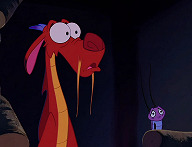
Instead of applause, this poem is followed by an explosion of fireworks detonating all around his military base. Mulan has finally destroyed Zongchang’s army beyond salvaging. The Dog-Meat General himself is killed by an officer avenging his father; Li Shang blows his smoking pistol with satisfaction. Shang follows Mulan back to Shanghai, where they begin a new life together in a unified China.
AN: This picture came out looking very similar to the design that Jacquelynn Harris gave Mulan in her Disney flapper series. I assume this is because we both based the outfit on Mulan’s matchmaker attire, and her hair on actress Anna May Wong. The background border is clipart.
On the story: In the old version of my Disney flapper series, I set all the stories in the U.S. Someone suggested that I look at non-Western fashion from the era, and I dismissed the idea, ignorantly assuming that the Roaring Twenties only happened in the West. This time around, I decided to check if anything interesting was happening in China in the 1920s…and wow, what a rabbit hole! So many things fit so perfectly with Disney’s version of Mulan, especially with that bizarre Zongchang character. I’d never personally create an Asian villain with “dog meat” in his name, but the Dog-Meat General is one of those “can’t make this sh-t up” historical figures. Of course I took liberties with how the history actually played out, as Disney often does; but all of the personal traits described, from the numbered harem to the literal dog meat to that poem, were real. And yes, he was killed by an officer avenging a relative.
To anyone so inclined, here are a couple of incredible time-capsul videos from China in around this time period.
Up the Wangpoo River to Shanghai (1920s)
A video with sound and color from 1929
#prohibition princesses#disney flappers#fa mulan#mulan#1920s#roaring twenties#feibo girl#flapper#china#chinese#chinese new year#qipao#cheongsam#sun yat sen#zhang zongchang#dog-meat general#chinese history#disney princess#digital art#fan art#art#roaring twenties au#feather boa#dragon#year of the dragon#shanghai#cabaret#warlord era#warlord#asia
19 notes
·
View notes
Text
吾今日觀《唐探1900》,感觸頗深,遂撰此篇。電影較爲尊重歷史,生動呈現二十世紀初,華人之窘境。彼時中國積貧積弱,備受列強侵略;華人在美國受盡排擠與侮辱,未享受真正之自由平等。
以史爲鑒,既可知興替,亦可汲教訓,免重蹈覆轍。一則,各民族、國家應自強不息,贏他人尊重;二則,長江黃河不會倒流,縱觀歷史,極端民族主義與排外情緒屢致悲劇,吾輩應防其蔓延。民族平等與世界多邊,乃人類之希望,亦爲孫中山「人類進化,世界大同」之體現。
噫!人類可否以史爲鑒而汲教訓邪?吾憂之。
Today, after watching “Detective Chinatown 1900”, I was deeply moved and thus write this piece. The film respects history to a great extent, vividly showing the plight of Chinese people in the early 20th century. At that time, China was poor and weak, suffering repeated invasions by foreign powers. Chinese people in the USA endured many of discrimination and humiliation, without enjoying true freedom and equality.
Taking history as a mirror, we can not only learn about the rise and fall of dynasties and countries, but also draw lessons from it to avoid repeating past mistakes. Firstly, all ethnic groups and countries should strive to become stronger and win the respect of others. Secondly, Yangtze River and Yellow River won’t flow backward. Throughout history, extreme nationalism and xenophobia have repeatedly led to tragedies. We should against their spread. Ethnic equality and a multilateral world are the hope of humanity, and also embody Sun Yat-sen's "human progress and world of Great Harmony."
Alas! Can humanity learn from history and draw lessons from it? I’m concerned about it.

#唐探#唐探1900#唐人街探案#detective chinatown#detective chinatown 1900#電影#电影#film#movies#feelings#感受#感想#感想文#article
5 notes
·
View notes
Note
VOR of Sun Zhongshan?
Hm, probably overrated though still decent VOR. Sun Zhongshan - or Sun Yat-Sen as he is commonly known in the west - was in fact the leader of failed rebellions, multiple of them, in the lead-up of the 1911 Xinhai rebellion - he was almost deposed in 1907 as the leader of his revolutionary party, the Tongmenghui. He was uninvolved in the Xinhai revolution himself as well, which itself was a very decentralized revolution. I think its pretty apparent that the death of the Qing Dynasty was a structural affair, with so many individual dissidents piling up that the monarchy couldn't stand anymore. If Sun magically dies it makes no big difference.
What he was talented at was getting overseas Chinese to channel funding into domestic revolutionary movements, that job he does with few peers. This did not matter too much for 1911, but for the founding of the rival KMT government in Canton as the new Republic of China collapsed, it mattered much more - that foreign funding & expertise would give it the assets it needed to be a locus for modernizing factions in China. Additionally, here Sun Zhongshan was ahead of the curve - he was advocating for a new government to be built as early as 1914, and being rebuffed by most of his liberal compatriots who were still trying to make the doomed Republican government work. And timing matters a lot here - the KMT needed to move quickly to take advantage of the power vacuum of collapse to build strength. When the collapse happens he is out front, ready to roll, and people (including the Soviets!) flock to him for it. Then he dies, whoops.
So for much of his history he is low VOR, but these things are a work of a lifetime - when it mattered, for a brief window he was the only guy in the room to see what needed to happen and was able to make it work. B-
14 notes
·
View notes
Note
Hi! I saw some of your hws China thoughts lately and they were really fun to read, it's always especially interesting to see takes from other sino related people 😆 Do you think Manchu(ria) would be a separate figure (from Wang Yao) during the Qing dynasty, or do you think the Jurchen tribes would've just been absorbed along the way? People always have such different takes on it so I'm curious to know your thoughts.
hey, thanks for this question! :-) i do enjoy thinking about yao's characterisation, even more so in relation to other nations. this is my view of it:
i'm personally inclined to see manchuria as a separate personification during the qing dynasty (though i admittedly haven't developed a detailed idea of their character/personality). i've previously written scenes in the aftermath of the opium wars where yao was at the signing of the treaty of nanking (for example)—but i see it as a situation where yao is rather being ordered around by manchuria (and the humans think yao is a qing official). my thought process is that while the manchu rulers may have adopted certain aspects of han chinese culture to bolster their legitimacy with the wider population, they still held real power, retained certain customs, influenced chinese dressing (the cheongsam) and even tried imposing some of their cultural norms on the entire population. the queue hairstyle for men, and less successfully, the attempt to ban foot-binding for women (that's one thing where i'm "really? you guys should've already cut that bullshit out centuries ago" @ the ancestors 😔). so, to me this is very far from a situation where a nation dies.
in my view of chinese history, there have been times when yao, as an empire, (like rome or persia) has ended or absorbed other nations. the southwards expansion of the han dynasty, for example: the disappearance of the "baiyue" tribes, through conquest, settlers and sinicisation (the totality of that cultural conquest always struck me—that we don't even know what they called themselves today). the conquest of vietnam is one instance where that didn't happen—and even more so for qing china, where manchuria is the one calling the shots. and i don't see a nation adopting some aspects of another nation's culture = death precisely because all cultures change. there's that joke classicists have made about "did the romans conquer greece, or did the greeks conquer rome?" given how much they adopted greek culture aesthetics but we wouldn't say "the romans were not a distinct cultural entity" either. naturally, there are big differences between the qing and roman empires, but most empires weren't above adopting some customs of those they conquered—it's indeed often how successful incorporation worked.
it's also about characterisation and narrative choices for me too; imo yao saw the opium wars as a doubled humiliation. being subject to the "western barbarians"—while being ruled by other "barbarians"; yao's pride is one thing that is stubborn, and he'll cling to the shreds of it. my immediate thought is that if manchuria isn't a separate character, a lot of this narrative loses the force; when it comes to how i'd translate the history into interactions between all these eldritch beings. this is especially when i'm thinking of the subsequent anti-qing movements; and how folks like sun yat-sen laid the blame for china's downfall at the hands of western empires on the manchu ruling dynasty and even characterised them as a colonial force ultimately hobbling china's progress (even if of course, irl history is more complex and there were manchu officials/figures who supported republicanism and the end of the regime). so in this context, to me it's best represented as a multi-layered power struggle between yao, manchuria and of course all the other western nations.
so overall, while history can always be interpreted and translated into hetalia many ways, and i wouldn't say there's a definitive "right" or "wrong" criteria when translating it into whether a hetalia personification dies or endures— personally, it makes the most sense for me if manchuria is a separate character during this era for all the abovementioned reasons. nations after all, aren't states, with all that strict international legal criteria about what a "legitimate" state is—but imagined communities. hetalia personifications are that idea extended further— given flesh and incarnated by the dreams, beliefs and imagination of humans: they're fluid and ambiguous—but also resilient, because it's not so easy to kill an idea.
#hetalia#long post#hws china#hws manchuria#hope that makes sense!#this whole ask is right in the family history and i liked thinking about it
44 notes
·
View notes
Text
Undeterred by the pouring rain, a long convoy of motorbikes carrying cheering, flag-waving supporters of Cambodia's ruling party revved their engines in preparation for their triumphant final rally in downtown Phnom Penh.
People dutifully lined the road as far as you could see, party stickers on their cheeks, the sky-blue hats and shirts they had been given to wear getting steadily wetter.
Perched on the back of a truck, Hun Manet, the 45-year-old eldest son of Prime Minister Hun Sen, greeted the crowds proclaiming that only the Cambodian People's Party (CPP) was capable of leading the country.
Indeed, his father had made sure that the CPP was the only party which could possibly win the election.
Hun Sen, 70, has run Cambodia in his trademark pugnacious style for 38 years: first in a Vietnam-installed communist regime, then under a UN-installed multi-party system, and more recently as an increasingly intolerant autocrat.
The only party now capable of challenging his rule, the Candlelight Party, was banned from the election on a technicality in May. The remaining 17 parties allowed to contest it were too small or too little-known to pose a threat.
A few hours after the polls closed, the CPP claimed the expected landslide, with a turnout of more than 80%. There were quite high levels of spoiled ballot papers in some polling stations: that was probably the only safe way voters could show their support for the opposition.
With Hun Manet expected to succeed his father within weeks of the vote, in a long-prepared transfer of power, this felt more like a coronation than an election.
"I don't think we can even call it a sham election," says Mu Sochua, an exiled former minister and member of the CNRP, another opposition party banned by the Cambodian authorities in 2017.
"We should call it a 'selection', for Hun Sen to make sure that his party will select his son as the next prime minister of Cambodia, to continue the dynasty of the Hun family."
Yet there were signs of nervousness in the CPP before the vote. New laws were hurriedly passed criminalising any encouragement of ballot-spoiling or a boycott. Several Candlelight members were arrested.
"Why was the CPP campaigning so hard, against no one in this election with no real opposition?" asks Ou Virak, founder of the Cambodian think tank Future Forum.
"They knew they would win the election - that was an easy outcome for them. But winning legitimacy is much more difficult.
"They need to keep weakening the opposition, but at the same time, they also need to satisfy the people, so there is no repeat of previous setbacks and disruptions, like street protests."
Hun Sen is one of Asia's great survivors, a wily, street-smart politician who has time and again outmanoeuvred his opponents. He has skilfully played off China, by far the biggest foreign investor these days, against the US and Europe, which are trying to claw back lost influence in the region.
But he has come close to losing elections in the past. He is still vulnerable, to rival factions in his own ruling party, and to any sudden downturn in the Cambodian economy which could sour public opinion against him. So as he prepares for a once-in-a-generation leadership change, he is trying to cement his legacy.
A short drive north of the capital, a 33m-high concrete-and-marble monolith was built recently, which he calls the Win-Win memorial.
Its massive base is covered in carved stone reliefs, echoing Cambodia's greatest historic monument, Angkor Wat.
They depict Hun Sen's flight from Khmer Rouge-ruled Cambodia to Vietnam in 1977, his triumphant return with the invading Vietnamese army in 1979, and his eventual deal with the last of the Khmer Rouge leaders in 1998 that ended the long civil war - his win-win for the Cambodian people.
Delivering peace and prosperity has long been Hun Sen's main claim to legitimacy. Since 1998, Cambodia has had one of the world's fastest-growing economies, albeit from a very low base.
But it is a model of growth which has concentrated wealth in the hands of a few families - the number of ultra-luxury cars on the roads of such a low-income country is jarring. It has encouraged rapacious exploitation of Cambodia's natural resources and it has left many ordinary people feeling that they are not winning under Mr Sen.
Prak Sopheap lives with her family at the back of an engine repair shop, squeezed between the main road and one of the many shallow lakes in the low-lying land outside Phnom Penh. They have been there for 25 years, fishing and cultivating vegetables on the lake.
Today, though, much of the lake has been filled with rubble by a property developer and Ms Sopheap's family have been ordered to leave.
She showed me a document from the local council, confirming how long she had lived there, and another document, a summons to court on a charge of illegally occupying state land. She feels powerless and angry - and she is not alone.
Land disputes are among the most incendiary grievances in Cambodia. All property deeds were destroyed in the Khmer Rouge revolution.
Since the end of the civil war, millions of hectares have been allocated for commercial development, a lucrative arrangement which has made many politicians and businesses allied to Hun Sen very rich.
The courts very rarely rule against these powerful interests. Transparency International ranks Cambodia as 150th out of 180 countries for corruption: in the Asia-Pacific region, only Myanmar and North Korea rank lower.
"Hun Sen always talks about his 'win-win policy'", says Ms Sopheap. "But we feel it is he alone who wins. We cannot feel at peace, as we now face eviction. We, the real Cambodian people, who live on this land, are suffering in the name of development."
Those who have tried to campaign against land grabs and evictions have been harassed, beaten and jailed, as have trade unionists and supporters of opposition parties. I asked Ms Sopheap how she would vote in this election. "Who can I choose?" she asked. "Who can protect me?"
Half of those eligible to vote are under 35 years old. The CPP has tried attracting them by having Hun Manet and other younger party leaders run this year's campaign, with a slick social media strategy.
But as most Cambodians have no memory of war or the Khmer Rouge, Ly Chandravuth, a 23-year-old law graduate and environmental activist, says the old CPP campaign points are no longer persuasive.
"Hun Manet's biggest challenge will be that my generation is very different from previous ones, who were traumatised by the Khmer Rouge," he says.
"Since I was a child, I have watched the ruling party reminding us of that tragedy, telling us that as they brought peace, we should support them. But that argument is less and less effective. Every time the ruling party brings it up, the young generation mocks them, because they have been repeating it for 30 years."
Can Hun Manet modify the rough-house, sometimes thuggish leadership style of his father to a softer and more subtle kind of rule? Despite his Western education, his years heading the army and his long apprenticeship, he has never yet held a top political office.
With him, other "princeling" sons of Hun Sen's contemporaries, such as Defence Minister Tea Banh and Interior Minister Sar Keng, are also expected to replace their fathers in the cabinet - a dynastic shift which keeps the levers of power with the same families, but in less experienced hands. The next few years could be a delicate, even dangerous time for Cambodia.
13 notes
·
View notes